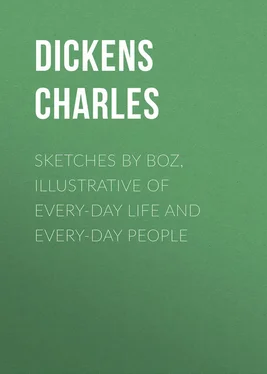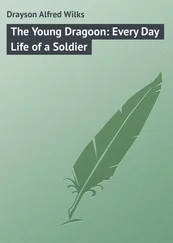Чарльз Диккенс - Sketches by Boz, Illustrative of Every-Day Life and Every-Day People
Здесь есть возможность читать онлайн «Чарльз Диккенс - Sketches by Boz, Illustrative of Every-Day Life and Every-Day People» — ознакомительный отрывок электронной книги совершенно бесплатно, а после прочтения отрывка купить полную версию. В некоторых случаях можно слушать аудио, скачать через торрент в формате fb2 и присутствует краткое содержание. Жанр: foreign_antique, foreign_prose, на английском языке. Описание произведения, (предисловие) а так же отзывы посетителей доступны на портале библиотеки ЛибКат.
- Название:Sketches by Boz, Illustrative of Every-Day Life and Every-Day People
- Автор:
- Жанр:
- Год:неизвестен
- ISBN:нет данных
- Рейтинг книги:3 / 5. Голосов: 1
-
Избранное:Добавить в избранное
- Отзывы:
-
Ваша оценка:
- 60
- 1
- 2
- 3
- 4
- 5
Sketches by Boz, Illustrative of Every-Day Life and Every-Day People: краткое содержание, описание и аннотация
Предлагаем к чтению аннотацию, описание, краткое содержание или предисловие (зависит от того, что написал сам автор книги «Sketches by Boz, Illustrative of Every-Day Life and Every-Day People»). Если вы не нашли необходимую информацию о книге — напишите в комментариях, мы постараемся отыскать её.
Sketches by Boz, Illustrative of Every-Day Life and Every-Day People — читать онлайн ознакомительный отрывок
Ниже представлен текст книги, разбитый по страницам. Система сохранения места последней прочитанной страницы, позволяет с удобством читать онлайн бесплатно книгу «Sketches by Boz, Illustrative of Every-Day Life and Every-Day People», без необходимости каждый раз заново искать на чём Вы остановились. Поставьте закладку, и сможете в любой момент перейти на страницу, на которой закончили чтение.
Интервал:
Закладка:
Mr. Barker was the identical cad who nobly distinguished himself, some time since, by keeping a tradesman on the step – the omnibus going at full speed all the time – till he had thrashed him to his entire satisfaction, and finally throwing him away, when he had quite done with him. Mr. Barker it ought to have been, who honestly indignant at being ignominiously ejected from a house of public entertainment, kicked the landlord in the knee, and thereby caused his death. We say it ought to have been Mr. Barker, because the action was not a common one, and could have emanated from no ordinary mind.
It has now become matter of history; it is recorded in the Newgate Calendar; and we wish we could attribute this piece of daring heroism to Mr. Barker. We regret being compelled to state that it was not performed by him. Would, for the family credit we could add, that it was achieved by his brother!
It was in the exercise of the nicer details of his profession, that Mr. Barker’s knowledge of human nature was beautifully displayed. He could tell at a glance where a passenger wanted to go to, and would shout the name of the place accordingly, without the slightest reference to the real destination of the vehicle. He knew exactly the kind of old lady that would be too much flurried by the process of pushing in and pulling out of the caravan, to discover where she had been put down, until too late; had an intuitive perception of what was passing in a passenger’s mind when he inwardly resolved to ‘pull that cad up to-morrow morning;’ and never failed to make himself agreeable to female servants, whom he would place next the door, and talk to all the way.
Human judgment is never infallible, and it would occasionally happen that Mr. Barker experimentalised with the timidity or forbearance of the wrong person, in which case a summons to a Police-office, was, on more than one occasion, followed by a committal to prison. It was not in the power of trifles such as these, however, to subdue the freedom of his spirit. As soon as they passed away, he resumed the duties of his profession with unabated ardour.
We have spoken of Mr. Barker and of the red cab-driver, in the past tense. Alas! Mr. Barker has again become an absentee; and the class of men to which they both belonged is fast disappearing. Improvement has peered beneath the aprons of our cabs, and penetrated to the very innermost recesses of our omnibuses. Dirt and fustian will vanish before cleanliness and livery. Slang will be forgotten when civility becomes general: and that enlightened, eloquent, sage, and profound body, the Magistracy of London, will be deprived of half their amusement, and half their occupation.
CHAPTER XVIII – A PARLIAMENTARY SKETCH
We hope our readers will not be alarmed at this rather ominous title. We assure them that we are not about to become political, neither have we the slightest intention of being more prosy than usual – if we can help it. It has occurred to us that a slight sketch of the general aspect of ‘the House,’ and the crowds that resort to it on the night of an important debate, would be productive of some amusement: and as we have made some few calls at the aforesaid house in our time – have visited it quite often enough for our purpose, and a great deal too often for our personal peace and comfort – we have determined to attempt the description. Dismissing from our minds, therefore, all that feeling of awe, which vague ideas of breaches of privilege, Serjeant-at-Arms, heavy denunciations, and still heavier fees, are calculated to awaken, we enter at once into the building, and upon our subject.
Half-past four o’clock – and at five the mover of the Address will be ‘on his legs,’ as the newspapers announce sometimes by way of novelty, as if speakers were occasionally in the habit of standing on their heads. The members are pouring in, one after the other, in shoals. The few spectators who can obtain standing-room in the passages, scrutinise them as they pass, with the utmost interest, and the man who can identify a member occasionally, becomes a person of great importance. Every now and then you hear earnest whispers of ‘That’s Sir John Thomson.’ ‘Which? him with the gilt order round his neck?’ ‘No, no; that’s one of the messengers – that other with the yellow gloves, is Sir John Thomson.’ ‘Here’s Mr. Smith.’ ‘Lor!’ ‘Yes, how d’ye do, sir? – (He is our new member) – How do you do, sir?’ Mr. Smith stops: turns round with an air of enchanting urbanity (for the rumour of an intended dissolution has been very extensively circulated this morning); seizes both the hands of his gratified constituent, and, after greeting him with the most enthusiastic warmth, darts into the lobby with an extraordinary display of ardour in the public cause, leaving an immense impression in his favour on the mind of his ‘fellow-townsman.’
The arrivals increase in number, and the heat and noise increase in very unpleasant proportion. The livery servants form a complete lane on either side of the passage, and you reduce yourself into the smallest possible space to avoid being turned out. You see that stout man with the hoarse voice, in the blue coat, queer-crowned, broad-brimmed hat, white corduroy breeches, and great boots, who has been talking incessantly for half an hour past, and whose importance has occasioned no small quantity of mirth among the strangers. That is the great conservator of the peace of Westminster. You cannot fail to have remarked the grace with which he saluted the noble Lord who passed just now, or the excessive dignity of his air, as he expostulates with the crowd. He is rather out of temper now, in consequence of the very irreverent behaviour of those two young fellows behind him, who have done nothing but laugh all the time they have been here.
‘Will they divide to-night, do you think, Mr. – ’ timidly inquires a little thin man in the crowd, hoping to conciliate the man of office.
‘How can you ask such questions, sir?’ replies the functionary, in an incredibly loud key, and pettishly grasping the thick stick he carries in his right hand. ‘Pray do not, sir. I beg of you; pray do not, sir.’ The little man looks remarkably out of his element, and the uninitiated part of the throng are in positive convulsions of laughter.
Just at this moment some unfortunate individual appears, with a very smirking air, at the bottom of the long passage. He has managed to elude the vigilance of the special constable downstairs, and is evidently congratulating himself on having made his way so far.
‘Go back, sir – you must not come here,’ shouts the hoarse one, with tremendous emphasis of voice and gesture, the moment the offender catches his eye.
The stranger pauses.
‘Do you hear, sir – will you go back?’ continues the official dignitary, gently pushing the intruder some half-dozen yards.
‘Come, don’t push me,’ replies the stranger, turning angrily round.
‘I will, sir.’
‘You won’t, sir.’
‘Go out, sir.’
‘Take your hands off me, sir.’
‘Go out of the passage, sir.’
‘You’re a Jack-in-office, sir.’
‘A what?’ ejaculates he of the boots.
‘A Jack-in-office, sir, and a very insolent fellow,’ reiterates the stranger, now completely in a passion.
‘Pray do not force me to put you out, sir,’ retorts the other – ‘pray do not – my instructions are to keep this passage clear – it’s the Speaker’s orders, sir.’
‘D-n the Speaker, sir!’ shouts the intruder.
‘Here, Wilson! – Collins!’ gasps the officer, actually paralysed at this insulting expression, which in his mind is all but high treason; ‘take this man out – take him out, I say! How dare you, sir?’ and down goes the unfortunate man five stairs at a time, turning round at every stoppage, to come back again, and denouncing bitter vengeance against the commander-in-chief, and all his supernumeraries.
Читать дальшеИнтервал:
Закладка:
Похожие книги на «Sketches by Boz, Illustrative of Every-Day Life and Every-Day People»
Представляем Вашему вниманию похожие книги на «Sketches by Boz, Illustrative of Every-Day Life and Every-Day People» списком для выбора. Мы отобрали схожую по названию и смыслу литературу в надежде предоставить читателям больше вариантов отыскать новые, интересные, ещё непрочитанные произведения.
Обсуждение, отзывы о книге «Sketches by Boz, Illustrative of Every-Day Life and Every-Day People» и просто собственные мнения читателей. Оставьте ваши комментарии, напишите, что Вы думаете о произведении, его смысле или главных героях. Укажите что конкретно понравилось, а что нет, и почему Вы так считаете.












